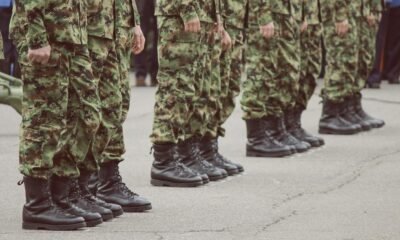Entertainment
Pentagon Revamps Policies to Honor Hundreds of LGBTQ Veterans Discharged

In a significant move toward rectifying past injustices, the Pentagon will soon upgrade the discharges of approximately 820 gay and lesbian veterans. This decision is part of a broader effort to address decades of discrimination against LGBTQ service members, as announced by Secretary of Defense Lloyd Austin on Tuesday.
The upgraded discharges will erase derogatory records, allowing these veterans to access benefits like healthcare. Austin stated, “We will continue to honor the service and the sacrifice of all our troops—including the brave Americans who raised their hands to serve but were turned away because of whom they love.”
This announcement follows a pledge made over a year ago, in which the Pentagon agreed to review cases of service members expelled during the “don’t ask, don’t tell” era from 1994 to 2011. Advocacy groups hailed this commitment, which aims to reverse years of policies that adversely affected LGBTQ service members.
Mo Siedor, legal director at Swords to Plowshares, emphasized the impact of such discharges, noting that many veterans lost the sense of pride that comes with military service, along with career opportunities that an honorable discharge would have provided. “The DOD is acknowledging that loss and correcting some of the injustice inflicted by ‘don’t ask, don’t tell,’” he remarked.
However, the backdrop of this development includes President Biden’s recent announcement regarding pardons for LGBTQ veterans who faced court-martial due to their sexual orientation. While advocates applauded these advances, they remain concerned about the thousands of LGBTQ veterans potentially overlooked in the process.
Reports have indicated that, as of late September, a mere eight veterans applied for Biden’s pardons. Critics have labeled the application process as burdensome and have suggested that the scope of the pardons is too restricted.
Advocates like Siedor cautioned that the Pentagon’s review only encompasses veterans who served at least six months during the specified era. Renée Burbank, from the National Veterans Legal Services Program, highlighted that the review ignored nearly 4,500 veterans who were discharged before reaching that six-month mark. As a result, these individuals remain classified under an “uncharacterized discharge,” which limits their access to benefits.
The Department of Defense has not commented on the criteria used to exclude records prior to 1993. It is estimated that around 114,000 veterans were dismissed from service due to their sexual orientation during the period leading up to the repeal of “don’t ask, don’t tell.”
Veterans who experienced discrimination before this era have been advised to seek discharge upgrades via military review boards. Nonetheless, cases like that of Mona McGuire illustrate ongoing challenges; McGuire was discharged in the late 1980s but failed to secure a discharge upgrade last year after a military board ruled against her.
Michael Wishnie, a Yale Law School professor, urged for continued efforts to identify veterans affected by discriminatory practices prior to the implementation of “don’t ask, don’t tell.” He indicated there remains a pressing need for the Pentagon to address these historical wrongs.
Although Austin acknowledged “President Biden’s leadership” in these initiatives, Peter Perkowski of Minority Veterans of America argued that the military’s response does not comprehensively address long-standing anti-gay policies. Perkowski pointed out that veterans dismissed for other reasons may also be victims of discrimination, calling recent efforts “well-meaning measures” that fall short of fully addressing the pervasive issues. “You’re going to get a couple hundred here, a couple hundred there, and you’re gonna keep wondering why these don’t work,” he noted.


















